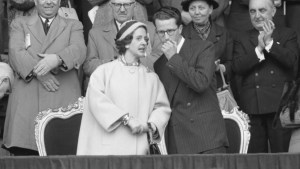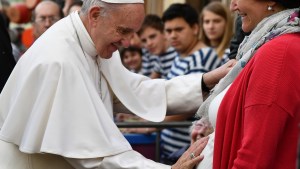Help Aleteia continue its mission by making a tax-deductible donation. In this way, Aleteia's future will be yours as well.
*Your donation is tax deductible!
On September 28, 2024, the Pope paid homage to King Baudouin (1930-1993) in the royal crypt of the Church of Our Lady of Laeken, where he is buried. This sovereign was temporarily “unable to reign” because he refused to sign a law legalizing abortion in Belgium.
Before leaving Belgium on September 29, the Pope announced that the beatification cause of the king will open.
“On my return to Rome, I will open the process for the beatification of King Baudouin,” Pope Francis announced at the end of a Mass celebrated in the stadium named after the former sovereign.
To the applause of the faithful in the stadium, Pope Francis paid tribute to King Baudouin, who ruled Belgium from 1951 to 1993, saying he hoped “that his example as a man of faith may enlighten those in power.”
“I ask that the Belgian bishops get involved in this cause,” said Pope Francis.

The day before, after the meeting in the Basilica of Koekelberg, where he met with Belgium’s Catholic community, Pope Francis visited the Royal Crypt beneath the Church of Our Lady of Laeken, where the tombs of many members of the Belgian Royal House are located. [The picture above shows the Pope’s visit to the tomb.]
Accompanied by King Philippe and Queen Mathilde, the Pope paid his respects in silence before the tomb of King Baudouin, the Vatican said in a statement about the visit, which was not on the official program.

In front of those present, he praised the “courage” of this man who chose to “leave his position as king in order not to sign a murderous law,” reported the Holy See.
Pope Francis also “urged Belgians to turn to [King Baudouin] at this time when criminal laws are being made” and expressed his wish that his cause of beatification move forward.
The Pope’s comments probably allude to the gradual extension of euthanasia, legalized in Belgium in 2002, and growing rapidly.
Baudouin, the fifth King of the Belgians and uncle of King Philippe, ruled Belgium for 42 years. The conscience of this fervent Catholic prevented him from signing the abortion law passed by parliament in 1990.
At the time, he invited the government and parliament to find a legal solution to ensure that he would not be held responsible for the law. A constitutional ruse was identified: The king was made “unable to reign” for 36 hours.
His nephew, the current King Philippe, is considered by some to be a “spiritual son” of King Baudouin, who had no children of his own and whose discreet piety he shares.
Culture of death complains
The Pope’s declaration immediately provoked strong reactions in Belgium’s pro-abortion society. The Centre d’action laïque (Secular Action Center) denounced the “astounding remarks,” calling it a “provocation” made on “the very day of the international day for the right to abortion.”
“Far from being the progressive that some want to present to us, the Pope is once again making remarks from another era,” accused the members of the center, who are calling on the Belgian government to address this “interference” from the leader of a ‘”theocratic” country.

For its part, the Royal Palace issued a brief statement to contextualize the pontiff’s remarks. “Their Majesties the King and Queen accompanied His Holiness the Pope this morning for a moment of recollection in the Royal Crypt,” it read.
“This impromptu visit, at the Pope’s request, was not part of the official program of his visit to Belgium and was strictly private. The King and Queen were present as a courtesy to the Pontiff.”
Belgium has a delicate political context: A constitutional monarchy where the King must keep a distance from political debates, in a context of recurring instability. On September 28, a coalition agreement enabled the emergence of a new government in Flanders.







